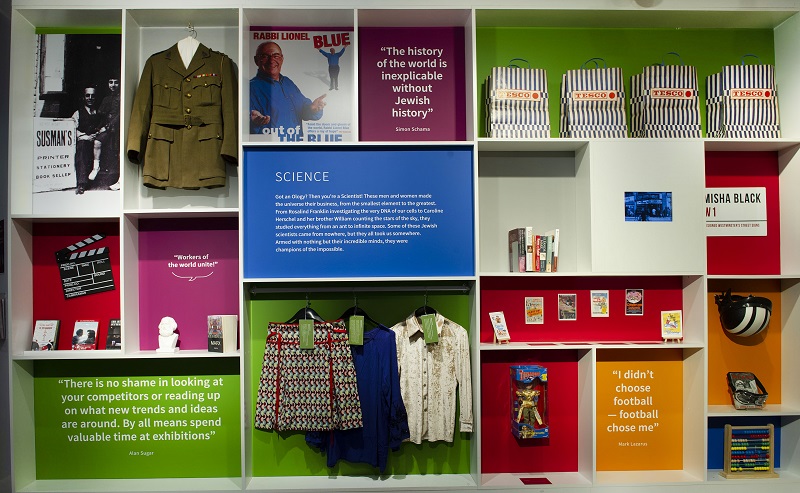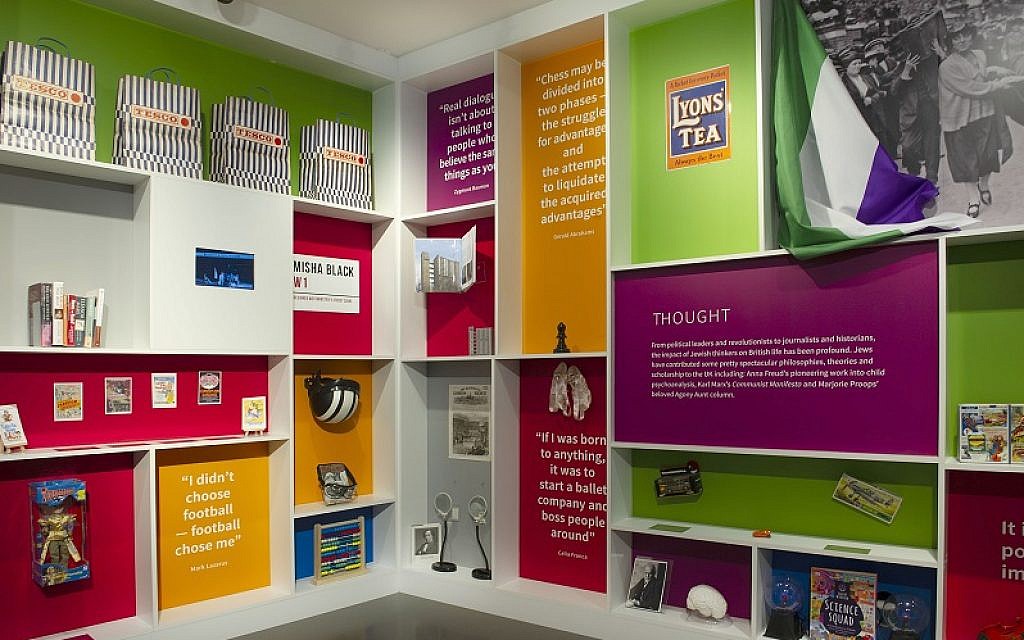Not just bagels! How British Jews have helped shape the country
Francine Wolfisz is surprised to discover the many Jewish contributions to British popular culture
What does a 60-year-old striped paper bag from Tesco, a heavy, wooden Slazenger tennis racket, Harry Potter’s scarf and – of all things – a flashing amber beacon from a zebra crossing all have in common?
As it turns out, all these items are connected to British Jews, whose ideas, brands, cultural contribution or discoveries have made a lasting impact well beyond their own lifetimes. Now their fascinating stories have been revealed, thanks to the Jewish Museum’s latest exhibition, Great British Jews: A Celebration, which runs until November.
The display, which is located just beyond the entrance hall on the ground floor, is a spin-off from the museum’s extensive Jewish Lives project, which looks at the widespread contribution of Jews in the categories of science, thought, public service, commerce, arts and sport.
Get The Jewish News Daily Edition by email and never miss our top stories Free Sign Up
In all, the stories of 2,000 people have been researched and are available to browse online, but here their achievements have been brought to life through physical objects.
Some of the items and names with which they are associated are immediately recognisable – the vintage paper bag from Tesco a nod to John (Jack) Cohen, who used his demobilisation money of £30 after the First World War to set up a market stall, then a shop and, finally, one of Britain’s most successful supermarket chains.
Likewise, there’s a signed photograph of Jewish actor Daniel Radcli ffe, positioned next to replicas of Harry Potter’s famous scarf, wand and glasses.
But then there are the everyday objects that have a lesser-known Jewish connection. Thousands of flashing amber beacons help people cross roads safely every day, but I was surprised to discover the so-called Belisha Beacon was the brainchild of Leslie Hore-Belisha – and all because he was very nearly hit by a driver not far from the Jewish Museum itself.
Curator Jemima Jarman explains: “While he was the minister for transport during the 1930s, he was very nearly run over in Camden High Street and was so outraged that he came up with the idea for an amber-coloured beacon on a striped pole at a crossing. Later on, the stripes were transferred to the road as well, giving rise to the zebra crossing. He also introduced the 30mph speed limit and the driving test.”
Elsewhere, it’s intriguing to read the story of Marcus Samuel, a businessman who travelled to China frequently to buy shells, paint them and bring them back to sell in Britain in the 1880s. It was during one such trip to Asia that he became aware of a new product – petrol – and decided to start up an oil transportation business.
Never forgetting his humble beginnings, Samuel named his new enterprise, Shell. Equally riveting is the connection between a Hungarian-born architect and James Bond’s nemesis.

Erno Goldfinger’s concrete high-rise buildings divided public opinion and was most famously taken to court by Sir Ian Fleming, who was particularly critical of Trellick Tower in Kensal Green. Such was his loathing for the design, that Fleming had no qualms in using “Goldfinger” as the name of his famous villain.
The achievements of Jewish female pioneers are also showcased throughout the exhibition, from Rose Heilbron, Britain’s first female judge, to Rosalind Franklin, who discovered and photographed the double helix of DNA, su ffragette and women’s activist Minnie Lansbury, child maths prodigy Ruth Lawrence and racing car driver Sheila Van Damm.
Elsewhere, a section hails the contribution of Joseph Malin, the first person to combine freshly cooked fish with chips, giving rise to what would become the nation’s favourite takeaway food.
Jarman adds: “Seen as a healthy and nutritious working man’s meal, fish and chips became such a staple of British life that it was among the few foods not rationed by the government, during the Second World War.”
Great British Jews: A Celebration runs until 3 November at Jewish Museum London. Details: jewishmuseum.org.uk

Thank you for helping to make Jewish News the leading source of news and opinion for the UK Jewish community. Today we're asking for your invaluable help to continue putting our community first in everything we do.
For as little as £5 a month you can help sustain the vital work we do in celebrating and standing up for Jewish life in Britain.
Jewish News holds our community together and keeps us connected. Like a synagogue, it’s where people turn to feel part of something bigger. It also proudly shows the rest of Britain the vibrancy and rich culture of modern Jewish life.
You can make a quick and easy one-off or monthly contribution of £5, £10, £20 or any other sum you’re comfortable with.
100% of your donation will help us continue celebrating our community, in all its dynamic diversity...
Engaging
Being a community platform means so much more than producing a newspaper and website. One of our proudest roles is media partnering with our invaluable charities to amplify the outstanding work they do to help us all.
Celebrating
There’s no shortage of oys in the world but Jewish News takes every opportunity to celebrate the joys too, through projects like Night of Heroes, 40 Under 40 and other compelling countdowns that make the community kvell with pride.
Pioneering
In the first collaboration between media outlets from different faiths, Jewish News worked with British Muslim TV and Church Times to produce a list of young activists leading the way on interfaith understanding.
Campaigning
Royal Mail issued a stamp honouring Holocaust hero Sir Nicholas Winton after a Jewish News campaign attracted more than 100,000 backers. Jewish Newsalso produces special editions of the paper highlighting pressing issues including mental health and Holocaust remembrance.
Easy access
In an age when news is readily accessible, Jewish News provides high-quality content free online and offline, removing any financial barriers to connecting people.
Voice of our community to wider society
The Jewish News team regularly appears on TV, radio and on the pages of the national press to comment on stories about the Jewish community. Easy access to the paper on the streets of London also means Jewish News provides an invaluable window into the community for the country at large.
We hope you agree all this is worth preserving.
- Exhibitions
- Arts
- Jewish Museum
- Great British Jews
- camden
- Tesco
- Slazenger
- harry potter
- Belisha Beacon
- Jack Cohen
- daniel radcliffe
- Leslie Hore-Belisha
- Erno Goldfinger
- Rose Heilbron
- Rosalind Franklin;
- Jemima Jarman
- Marcus Samuel
- Trellick Tower
- Kensal Green
- Minnie Lansbury
- Shell
- Ruth Lawrence
- Sheila Van Damm
- Features
-
By Laurent Vaughan - Senior Associate (Bishop & Sewell Solicitors)
-
By Laurent Vaughan - Senior Associate (Bishop & Sewell Solicitors)
-
By Laurent Vaughan - Senior Associate (Bishop & Sewell Solicitors)
-
By Laurent Vaughan - Senior Associate (Bishop & Sewell Solicitors)






















